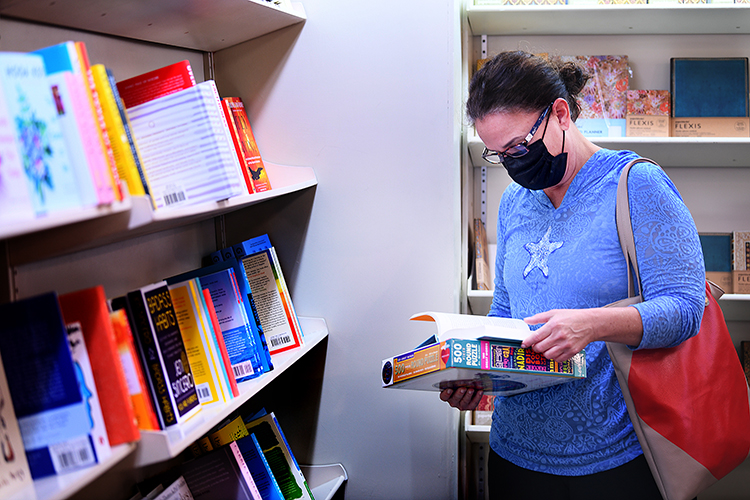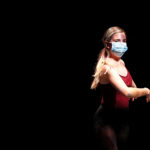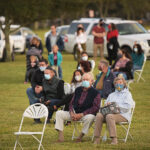
One year, more than 11,300 reported infections and 272 COVID-19 deaths later, Indian River County has come through the first 12 months of the pandemic better than many locales. Nevertheless, life here has changed in significant ways.
Local government facilities took lockdown measures seriously last spring, shielding employees from the public altogether, then gradually opening offices up by appointment, with masks and temperature checks.
But some services are still completely online or on a grab-and-go basis with drop boxes, digital forms and lobby pick-up arrangements to reduce personal contact.
Vero Beach Mayor Robbie Brackett is growing impatient with limitations placed on city operations and on the community in general that have persisted for many months.
As a business owner and an elected official, Brackett said he, like many in our community, had to be out and about, taking care of business in-person even during the precarious summer 2020 and post-holiday surges of COVID infections.
“I hope none of this becomes permanent procedure,” Brackett said “I don’t take the pandemic lightly – I had the virus, my parents had it and I was very concerned about them. But I hate the ‘new normal’ and how we’ve gotten away from personal contact. I want the normal back, not the new normal.”
Not one for emails or texts or virtual anything, Brackett said, “I understand if people aren’t comfortable or need to wear a mask, I respect that. But we need to get back to doing things face to face. I meet with people all the time.”
Amid the headlines, the hype and the focus on the worst-case scenario, Brackett said he and City Manager Monte Falls try their best to base city operations in reality.
“We deal with the numbers, the seven-day positivity rate, the number of cases and the hospitalizations. A year ago when we started all of this, the larger goal was to manage the pandemic until we got a vaccine, to keep hospitalizations down to not overwhelm our hospitals, and we’ve done that in Florida.”
Seeing people laid off and hours cut, and businesses struggling, Brackett said he’s grateful Florida stayed as open as possible. “I’m thrilled with how our governor has handled things. I know he had to shut us down for a short period of time but when he could he opened us back up.”
The pandemic has turned into a boon for Vero Beach in terms of people buying property and wanting to relocate permanently or invest in a winter home. “Our low density is the big thing we have going in our favor,” Brackett said. “When you look at the areas that had big problems, it’s where there is high density, where people are stacked on top of each other.”
Despite the increased demand for homes here, he said “we need to keep that low density that makes Vero attractive.”
Recreation programs, including some camps and classes, have welcomed residents back, and Brackett wants to see one very important hometown celebration resume this summer.
“I’ve got 4th of July on my list to talk to Monte about. I want to see the fireworks go ahead this year. Last year we canceled them because other cities around the state had canceled their fireworks and we didn’t want to see people pouring in from all of those places,” Brackett said.
After the daily case counts tapered off last fall, public meetings with public attendance and required in-person voting by elected officials resumed on Nov. 1 by executive order – a requirement that had been waived since March 20, 2020.
Considering its senior population, Vero is still taking live public comments through a web portal so residents can have real-time input into city decisions without risking infection, but more people have started showing up in person and commenting at the public podium since vaccinations began in December.
Getting things done at Indian River County offices typically required an appointment through most of the summer. As of Sept. 1, appointments are no longer required in order to receive in-person customer services at the Public Works, Community Development, and Utilities Departments located within the County Administration building.
Some divisions may still schedule but walk-ins are accommodated if staff is available, county spokesperson Kathleen Keenan said on Monday. Only the Tax Collector’s office is managing services by appointment only at this point, and that’s pretty standard statewide.
Local first responders could not simply close their doors and keep the public away when lockdowns were imposed – or meet people by appointment when lockdowns were lifted.
Police, fire and emergency medical services personnel braved the unknowns of COVID-19 and kept serving up-close and personal, potentially putting themselves in harm’s way in a new way.
The circulating virus also meant they could be carrying the sickness home to spouses, children or extended family in the home.
Firefighters and paramedics show up when people need to be treated and transported quickly and they often use a calm demeanor and a friendly smile to ease the process, but now they have to get the job done from behind a mask.
That’s been a major change, according to Indian River County Emergency Services Chief Tad Stone. “Two things come to mind,” he said when asked about major operational shifts in the past 12 months. “The constant use of PPE while responding to all calls regardless of how the call was received, and the establishment of the COVID Rescue units.”
Stone’s paramedics also jumped in to help with mass COVID-19 testing operations at nursing homes, with contact tracing and recently with vaccination efforts, providing stand-by emergency care at vaccine clinic sites in case anybody experienced a bad reaction to the shot.
Part of Stone’s job is the county’s emergency preparedness, so how much of the special COVID-19 procedures and equipment will stay with Emergency Services for the long haul?
“I believe that it is too soon to tell. I believe that we will look at patients a bit differently and assume that everyone is contagious with something. I also believe that the planning process for EMS will intensify and that we will need to dedicate the resources needed and to continue to be forward looking and leaning as we move forward,” Stone said.
Police officers typically arrive on the scene before fire-rescue arrives, assessing the volatility of the situation, the people involved and rendering emergency first aid or CPR if needed. Vero Beach Police Chief David Currey said the major change for his officers was having more tools to stay safe while they continued to protect life and property in the city. He credited federal CARES Act dollars granted to the city in 2020 with providing equipment and technology to help reduce the dangers of person-to-person policing in the age of coronavirus.
The Vero Beach Police Department acquired “portable antibacterial vaporizers to disinfect patrol vehicles, and the interior offices/rooms at the police department,” as well as hands-free water fountains, hand sanitizers and N-95 particle masks for all sworn officers to wear.
“All entry points to the police department have computer-based temperature screeners to include facial recognition for employees,” Currey said. Temperature checks, plus increased hand washing and sanitizing will become ongoing practices to keep everyone healthy, he added.
Currey has found one upside to pandemic protocols. “There was a substantial decrease in travel by employees for training purposes,” Currey said. “I believe many meetings will continue to be done virtually. I have been involved in numerous virtual meetings during the past year. Virtual meetings save time, travel, and are efficient. This type of meeting allows me to be at the police department in case something needs to be addressed.”
COVID-19 played havoc with the staffing of small businesses when key players were taken out of commission due to infection and everyone around them had to quarantine. The Shores Public Safety Department got hit very much like a small business in that respect.
“Our biggest operational challenge was manpower when an officer tested positive and the related quarantines that went along with it,” Shores Public Safety Capt. Mark Shaw said. “We didn’t have to use it, but we had the community center set to be used to house officers in the event they were required to be quarantined.”
The pandemic forced the department to enhance how it protects officers and the public, and those changes have become an inextricable part of everyday life.
“Moving forward, we will continually update our infectious disease protocols as needed. As well as keeping a larger stock of PPE gear on hand,” Shaw said. “The aerosol disinfectant sprayers will be something that we’ll keep in place as a standard practice as well.”
Over the next year and beyond, Shaw said his greatest concern is not the coronavirus, per se, but the human factor, and what could be around the corner. “Our biggest challenge moving forward will be complacency. It’s not if, but when the next pandemic hits.”
Photos by Kaila Jones and Brenda Ahearn



































